

2015 B. A. Gerrish
First edition
Published by Westminster John Knox Press
Louisville, Kentucky
15 16 17 18 19 20 21 22 23 2410 9 8 7 6 5 4 3 2
All rights reserved. No part of this book may be reproduced or transmitted in any form or by any means, electronic or mechanical, including photocopying, recording, or by any information storage or retrieval system, without permission in writing from the publisher. For information, address Westminster John Knox Press, 100 Witherspoon Street, Louisville, Kentucky 40202-1396. Or contact us online at www.wjkbooks.com.
Unless otherwise indicated, Scripture quotations are from the New Revised Standard Version of the Bible, copyright 1989 by the Division of Christian Education of the National Council of the Churches of Christ in the U.S.A., and are used by permission.
Book design by Drew Stevens
Cover design by Allison Taylor
Library of Congress Cataloging-in-Publication Data
Gerrish, B. A. (Brian Albert), 1931
Christian faith : dogmatics in outline / B.A. Gerrish. First edition.
pages cm
Includes bibliographical references and index.
ISBN 978-0-664-25698-2 (alk. paper)
1. Theology, Doctrinal. 2. Dogma. I. Title.
BT75.3.G47 2015
230dc23
2014049526
 The paper used in this publication meets the minimum requirements of the American National Standard for Information SciencesPermanence of Paper for Printed Library Materials, ANSI Z39.48-1992.
The paper used in this publication meets the minimum requirements of the American National Standard for Information SciencesPermanence of Paper for Printed Library Materials, ANSI Z39.48-1992.
Most Westminster John Knox Press books are available at special quantity discounts when purchased in bulk by corporations, organizations, and special-interest groups. For more information, please e-mail .
To my students at the Divinity School
of the University of Chicago
who worked with me through Dogmatics IIII,
19651996
Test everything: hold fast what is good.
The Apostle Paul
Contents
During my thirty-one years at the University of Chicago, I regularly taught both the history of Christian thought and what I persisted in calling dogmatics. In the yearlong dogmatics sequence, the class worked through the whole of Calvin's Institutes and Schleiermachers The Christian Faith, with only a few minor omissions, on the way to putting together individual constructive statements on the entire range of Christian doctrines. My original plan was to keep busy in retirement by preparing my store of lecture manuscripts and scattered notes for separate publications in historical theology and dogmatic theology, perhaps also for a weightier study of Schleiermacher than I attempted in my little book A Prince of the Church: Schleiermacher and the Beginnings of Modern Theology. (I paid my dues to my other favorite theologian in Grace and Gratitude: The Eucharistic Theology of John Calvin.) For two reasons, besides the brevity of human life, I decided to condense and combine the materials in a single project based on the blueprint I sketched in Saving and Secular Faith: An Invitation to Systematic Theology.
First, although a volume or two on the entire history of Christian thought and a separate study of Schleiermacher might have had some pedagogical value, I could not persuade myself that I had anything fresh to contribute. Besides the contributions of others, I myself had already written widely on the periods for which I could best claim to have furthered the state of the literature: the Reformation and modern Protestantism (with special attention to the relationship between them). In addition to books on Luther, Calvin, and nineteenth-century Reformed theology, I had published the specialized articles on Reformation theology and modern religious thought later collected in The Old Protestantism and the New, Continuing the Reformation, and Thinking with the Church. For the earlier periods, by contrast, I had not too much but too little to show. My lectures on patristic and medieval thought came from independent reading of primary sources, but only here and there had I been able to say anything fresh about Fathers and schoolmen, and the gaps in my reading would have been embarrassingly obvious.
Second, and more important, to combine my historical and dogmatic interests reflects my understanding of the task of dogmatics, which I take to be critical transmission of the Christian heritage. Dogmatic theologians are not like freelance philosophers who, though they may find their inspiration in the history of their discipline, are always able, in principle at least, to begin de novo. One might better compare dogmaticians to relay runners, except that in dogmatics the baton not only changes hands but also may itself be changedif real dogmatic theology is being done, not uncritical transmission. The dogmatic theologian asks what sense may still be made, in our day, of the historic tradition or traditions of the churches; and that, obviously, presupposes a working knowledge of the traditions as well as the present. This is one reason why I retain the name dogmatics: it expresses the intention to interpret and assess Christian faith as it has been articulated in the dogmasthe authorized beliefsof the churches and in the thinking of the church theologians who shaped them. But more on this in the introduction.
It may be that to speak of dogmas risks compromising the place of dogmatic theology among the various fields of academic study if, as frequently happens, the word is taken to imply that the church claims privileged access to authoritative truths not available for assessment by common human reason and experience. But that is not the understanding of dogma I shall be working with here; and dogmatics, like any other discipline, must naturally be defined from the insidewithout undue concern for whatever misunderstandings of its scope and method may come from the outside. The point of dogmatic theology is to test the authorized beliefs of the churches, not merely to propagate them. Perhaps it remains a drawback of the word dogma, and therefore of dogmatics, thateven when their use implies no esoteric pretensionstheir cognate is the adjective dogmatic, which suggests truculence and intransigence. Though the dictionaries do assign to dogmatic the meaning simply of being related to dogma, the primary sense is given to asserting or imposing personal opinions, arrogant, intolerantly authoritative. (I quote from The Oxford Dictionary and Thesaurus, American edition, 1996.) If the aim of the dogmatic theologian is to promote understanding, critical reflection, and conversation, a dogmatic attitude in that sense is not likely to help, though it may well recruit disciples. But it is excluded in principle from the following chapters.
I take it that, next to showing how the present has arisen out of the past, the task of an outline of dogmatics is to sum up the main options of the present with as impartial a hand as one can, even if, in an outline, a full account and appraisal of them is hardly possible. Clearly, however, one is not doing dogmatics unless a case is argued for the trajectory judged most likely to be fruitful in the future. There is no need to deny that where circumstance has placed the dogmatic theologian in the present is bound to influence the case made. For myself, I admit that some of my initial preferences are suggested by my location in the Reformed or Calvinist tradition, for example, the choice to assign a regulative role to the concepts of covenant and election or to conclude with the Calvinist watchwordin its way, a perfect summary of dogmaticsthat the end of the world is the manifestation of God's glory. Still it is Christian, not Reformed, dogmatics that I am attempting to do; whether a Reformed perspective, as one among others, can help to further the larger task is not to be presupposed but judged by the criteria to which the discipline of dogmatics must answer. This, too, is more fully discussed in the introduction.
Next page
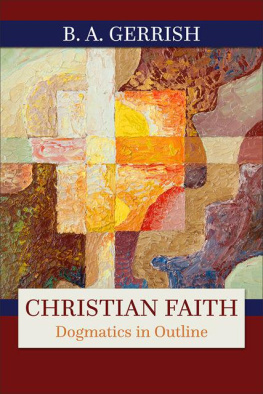
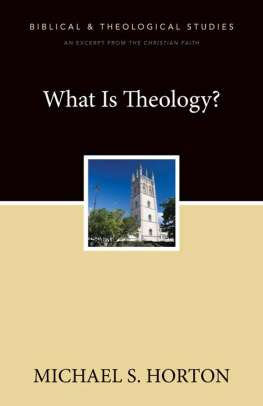
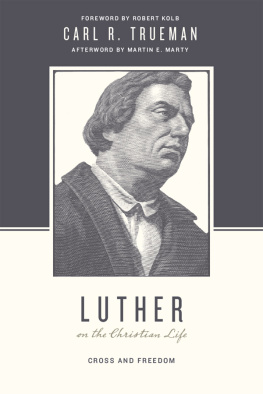
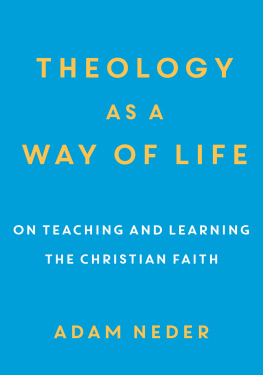
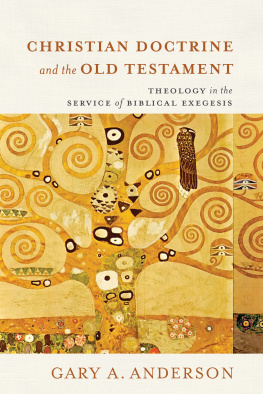
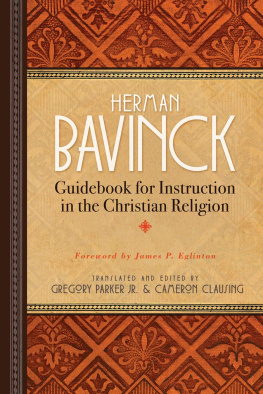
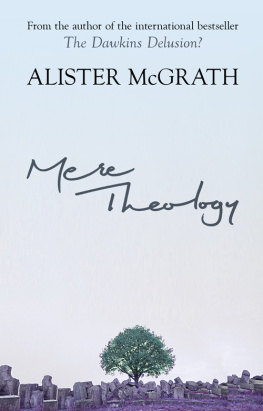
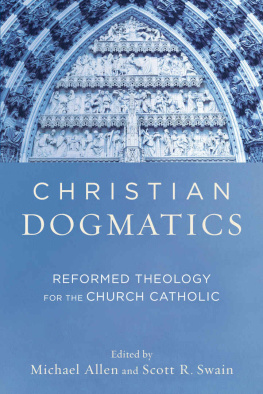
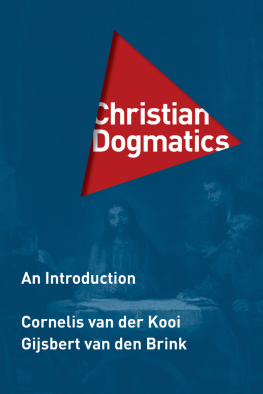
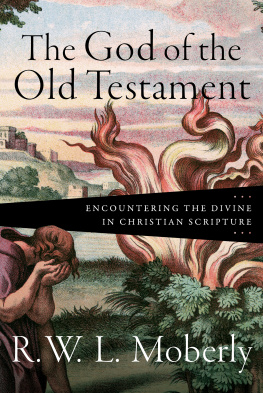
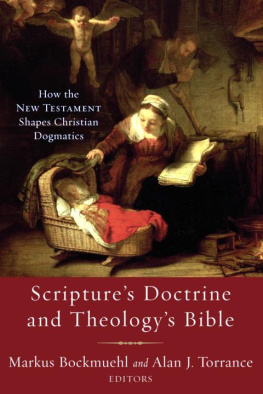
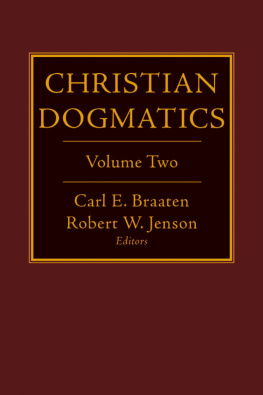
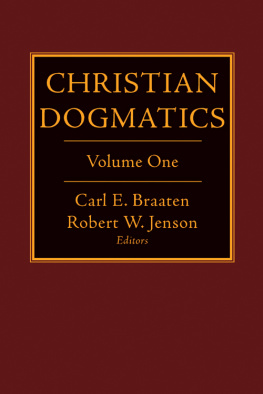


 The paper used in this publication meets the minimum requirements of the American National Standard for Information SciencesPermanence of Paper for Printed Library Materials, ANSI Z39.48-1992.
The paper used in this publication meets the minimum requirements of the American National Standard for Information SciencesPermanence of Paper for Printed Library Materials, ANSI Z39.48-1992.